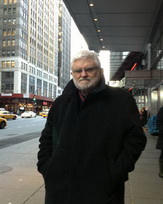Over
recent weeks, many have asked what Francis has achieved in the first year or so
of his being Bishop of Rome, the first pope to take the name of Francis and the
first member of the Society of Jesus to occupy the See of Peter.
Many
answers have been given by those both within the Church and beyond. Let me
consider just one suggestion, the movement beyond the fringe of fear.
Over
the years, the Christian message of hope in the Gospel has often been coloured
by a mostly hidden culture of fear. That may seem to be a broad brush stroke,
but it is a fact that has been underlying our difficulties in recent years.
This fear has been rooted in our distorted view
of papal jurisdiction, operating as a total and final backstop when change was
being discussed. The evident need for Collegiality, shown to us in the document of the Council, Lumen
Gentium, was never fully explored or realised with the closure of the Council.
We must ask why. In a letter published recently in The Tablet, I wrote
“The
courage of the local bishops is called upon to seek honest solutions within the
context of the local need. It is reflective of the recent comment by Cardinal
Karl Lehmann when he said that
“We need to be more courageous in dialogue within the Church. We complain that
Rome
is over-powerful
but the reason why
Rome
is so strong is
because we are too weak.” That was
a significant remark.”
For
me this is what has changed with Francis. He has not made sweeping statements
that discard the roots of tradition, nor offered a whole tranche of new ideas.
But he has shown a willingness to discuss our present difficulties, honestly and
openly, in a spirit of faith. This is the first stage towards crossing the
fringe of fear. It offers to all the opportunity to review, in the context of
genuine dialogue, the issues facing us in these early years of the 21st
Century. The Lord of our faith is not one of fear and trepidation but an open,
welcoming God of love who is within each one of us.
At
every layer of our Church structure, there has been a degree of fear and
hesitancy in respect to those above, bishops in respect of
Rome
, priests in respect of their
bishops who exercise their immediate management and people in respect of their
priests whose word in earlier years was total and final. The reality of being a
Christian demands that we look forward in hope, without the hesitancy of looking
over our shoulder checking out the consequences of our faith.
Yet
the vision of Church that is emerging is of an informed laity whose faith
involves the courage to articulate views that break the acceptance of a clerical
diktat, seeking dialogue. And priests themselves, are beginning to have
courageous conversations with each other and with their Bishops. The emergence
of the Association of Catholic Priests in
Ireland
, with a membership of over 1000
priests and the recent formation in the
United States
of a similar group as well as the
gatherings in
Europe
, are signs of a stirring in
courage, of essential faith overcoming an incipient fear.
Daniel
O’Leary, writing in his book “Already
Within” notes that “…it
is a pity, I now think, that, especially within our church institution, we are
all so fearful of disagreeing with ‘authority’ , of upsetting the status quo,
of telling our truth “
The
potentiality of the acorn to become a great tree is well illustrated in the
cover of his book that heads this posting. From a small seed grows a strong
tree. The courage to talk, to listen in faith, to trust that our journey in the
Lord is not unfounded, even when challenged, is the gift of the Holy Spirit
through the blessing on the Church of a Pope from
South America
.
It
is fundamental to our freedom as Christian pilgrims that fear is not part of the
package. We welcome the Christ into the centre of our lives and through our
lives, show him to others. In August 1996, three weeks before he died, Henri
Nouwen wrote “Often we praise prophets after they
are dead. Are we willing to be prophets while we are alive?”
That’s
worth thinking about.
Daniel
O’Leary’s most recent book is:
Treasured
and Transformed: Vision for the Heart; Understanding for the Mind
END
